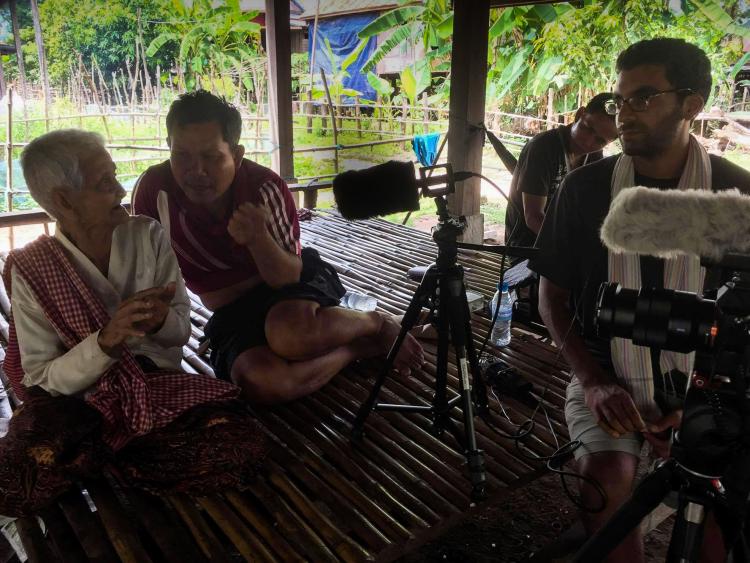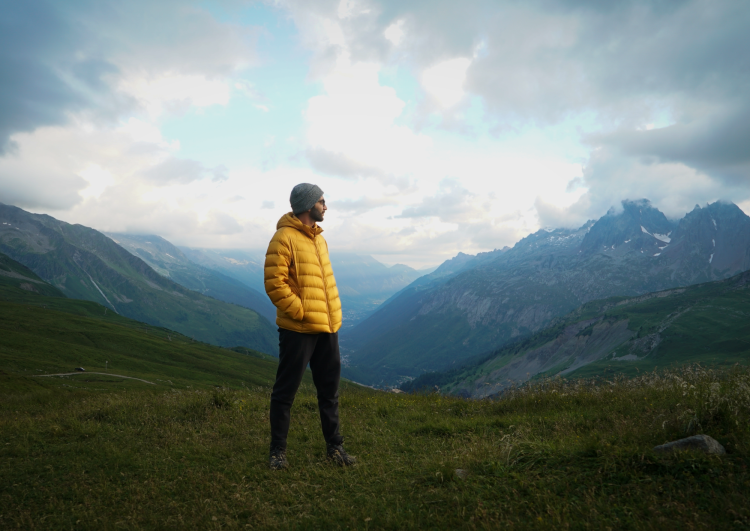The Ted Scripps Fellowships have been bringing award-winning environmental journalists to CU Boulder for 27 years. Fellows embark on a year of courses, projects, field trips, seminars and more— taking advantage of everything university life has to offer. This series is a chance to get to know this year’s cohort of talented journalists beyond what a typical bio page will tell you.
 Before becoming a Ted Scripps Fellow, Ishan Thakore worked as a multimedia producer and investigative journalist. During his career, Thakore has been the recipient of IRE’s Journalist of Color Fellowship, a Fulbright-National Geographic Digital Storytelling Fellowship, and a BBC/Sundance Institute Fellowship. Thakore’s work can be seen in THE CITY, Full Frontal with Samantha Bee, Netflix, the BBC, National Geographic blogs, and Al Jazeera.
Before becoming a Ted Scripps Fellow, Ishan Thakore worked as a multimedia producer and investigative journalist. During his career, Thakore has been the recipient of IRE’s Journalist of Color Fellowship, a Fulbright-National Geographic Digital Storytelling Fellowship, and a BBC/Sundance Institute Fellowship. Thakore’s work can be seen in THE CITY, Full Frontal with Samantha Bee, Netflix, the BBC, National Geographic blogs, and Al Jazeera.
During the fellowship, you’re reporting on the Army Corps of Engineers’ plan to protect New York from storm surges. Could you tell me a little bit more about that?
In 2012, Superstorm Sandy took this pretty gnarly left turn into the city and knocked out a lot of neighborhoods for a while, and flooded a bunch of subway tunnels. That was 11 years ago, and it's not clear that the city has made enough progress to prevent a freak storm like that from happening again. And in the 11 years since Superstorm Sandy, there have been what the city calls “significant rainfall events,” where we've gotten a ton of rain in four hours, and a lot of homes and basement apartments get flooded. There are all these weather challenges that we're facing in New York, and the city has this unique kind of topography also–it's like a series of islands and has these protected bays, and the Hudson runs through it. But that also means there's a lot of water that can quickly rush into the city and a lot of people want to live on the water because it's beautiful. But as New York looks to the future, there's this sense that if it doesn't prepare now, what's going to happen?
The Army Corps is the premier U.S. institution that builds large infrastructure projects. There are all these laws that dictate why the Army Corps can dam rivers and build levees and stuff. At the same time, there's a lot of criticism towards the Corps because historically, they've been very much a gray infrastructure agency, like, “Let's pour some concrete,” “Let's build a seawall,” “Let's engineer our way out of nature's periodic problems,” and that's proven to be really challenging. The reason I'm fascinated by this story is that New York combines all these elements: it's the future-looking strategy of the Corps as climate change becomes more prevalent, the historical past of how the Corps has built things, and also, how the richest, biggest city in America, has a choice to make on how it'll protect itself. People have a lot of opinions about this because everyone agrees that the city shouldn’t flood, but there's not that much agreement about what can be done.
When the Army Corps released its plan last year, there was a lot of criticism about how it was short-sighted and how it didn't account for different types of storms. You know, one source told me, when the project is done in 2045, it “would be horrible to get a screwdriver when we really needed a wrench.” What she meant was that, if we're going to spend all this time building something, it should work for the myriad problems that are going to exist in New York.
What led you to this line of research?
I was having a beer with a friend and he was telling me about his friend who was advocating against a huge wall in the Hudson River to protect the city from storm surges. I just laughed. If you look at Jersey City from Battery Park, it's not that far, you know, and we're gonna build this vertical wall, how is that even gonna work? I thought it was one of the craziest things I've ever heard. Then I talked to his friend later, and this isn’t just one wall, it is actually a series of walls and gates and some of the most intense engineering that would be done around a coastal city in the U.S. That just kind of captivated me because I’ve always been interested in this idea of how we try to tame nature and how it goes poorly.
It is very clear that you love New York. How are you enjoying Boulder and your time in the fellowship so far?

It's such a nice change of pace to do weekend trips. It’s so much harder in New York to go anywhere. I've really been enjoying the outdoors. I've been to Rocky Mountain National Park and Black Canyon of the Gunnison National Park and it's been fantastic. It was a bit of an adjustment to settle back into being a student again because it's such a different schedule. I felt a little unmoored with all this free time, like, what am I supposed to do? Or how am I supposed to best use it? And now I feel much more settled.
What is your favorite class so far?
I've been taking French, which has been really fun. And oceanography, which is getting me to appreciate the ocean much more. And then two law classes that are much more technical, but they complement each other quite well.
What do you like to do outside of journalism?
I love to go hiking, so moving to Boulder has been a great boost for the hobbies that I've been able to only sporadically indulge in when I was in New York. I really like playing sports. I've been able to play tennis here a couple of times, which is nice. In New York, I would have to wake up at six am and sign my name onto a clipboard, so that I could come back seven hours later to play. It was absolutely insane. Here I can just roll up to a court and play with a friend.
